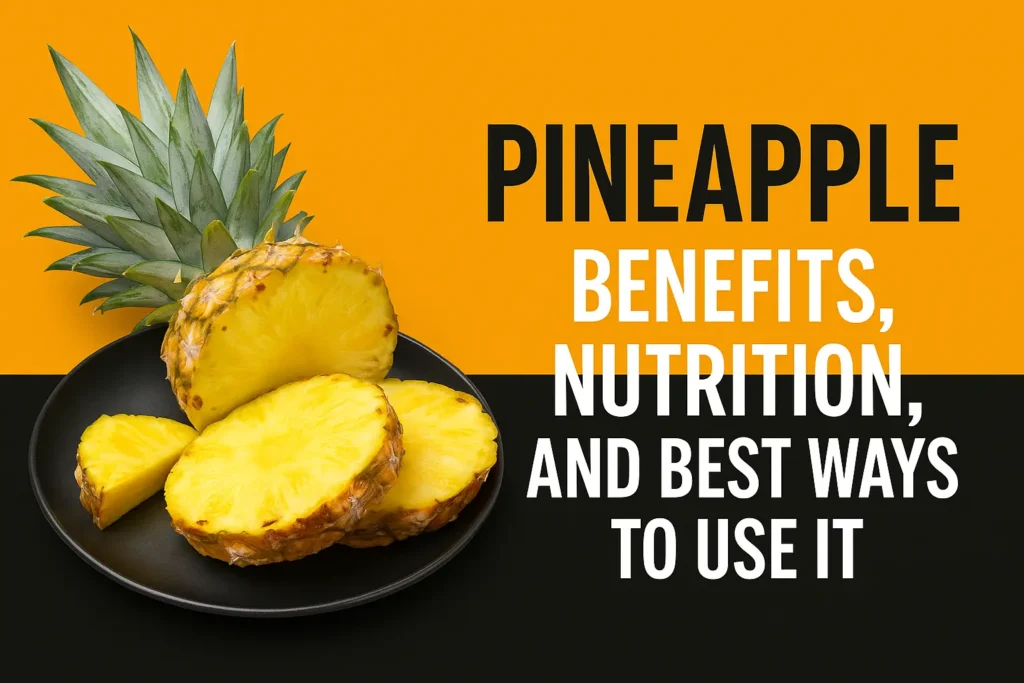Pineapple is not just a tropical delight; it is a nutritional powerhouse that offers a wide array of health benefits. Its juicy, sweet, and slightly tangy flavor makes it a favorite fruit around the world, but beyond taste, pineapple holds numerous health-promoting properties that make it a special addition to your diet. From aiding digestion to boosting immunity, let’s dive into why pineapple is unique and how to use it effectively for maximum benefits.
Nutritional Profile of Pineapple
Pineapple is rich in vitamins, minerals, and enzymes that are essential for overall health. Here’s a closer look at its nutritional content per 100 grams:
- Calories: 50 kcal
- Carbohydrates: 13 g
- Sugars: 10 g
- Fiber: 1.4 g
- Protein: 0.5 g
- Fat: 0.1 g
- Vitamin C: 79 mg (132% of daily requirement)
- Vitamin A: 58 IU
- Vitamin B6: 0.1 mg
- Manganese: 0.9 mg (45% of daily requirement)
- Copper: 0.1 mg
The high vitamin C content boosts immunity and acts as a powerful antioxidant, while manganese plays a key role in bone health, metabolism, and wound healing. Additionally, pineapple contains bromelain, a unique enzyme with multiple health benefits.
Health Benefits of Pineapple
1. Supports Digestion
Pineapple contains bromelain, an enzyme that helps break down proteins and improves digestive efficiency. Regular consumption of pineapple can reduce bloating, aid in nutrient absorption, and promote a healthy gut. It is particularly beneficial for people with digestive issues such as indigestion or constipation.
2. Boosts Immunity
Thanks to its high vitamin C content, pineapple strengthens the immune system. Vitamin C stimulates the production of white blood cells and acts as a powerful antioxidant, protecting the body against infections and harmful free radicals. Including pineapple in your diet can help reduce the frequency of colds and boost overall immunity.
3. Reduces Inflammation
Bromelain in pineapple has anti-inflammatory properties, which can help reduce swelling, joint pain, and inflammation-related conditions such as arthritis. Studies have shown that bromelain may also aid recovery from sports injuries and reduce muscle soreness after workouts.
4. Supports Heart Health
Pineapple contains antioxidants, fiber, and potassium, all of which contribute to heart health. Potassium helps regulate blood pressure, while fiber reduces cholesterol levels. The combination of these nutrients may lower the risk of cardiovascular diseases over time.
5. Promotes Healthy Skin
Vitamin C plays a crucial role in collagen synthesis, which is vital for maintaining skin elasticity and preventing wrinkles. Pineapple’s antioxidants also protect the skin from damage caused by free radicals, reducing premature aging and promoting a natural glow.
6. Aids Weight Management
Low in calories and high in fiber, pineapple is a great fruit for weight management. Fiber promotes a feeling of fullness, helping control appetite, while natural sugars provide a healthier alternative to processed sweeteners.
7. Supports Bone Health
Manganese, abundantly found in pineapple, is essential for strong bones and connective tissue. Regular consumption supports bone density, reducing the risk of osteoporosis and fractures in the long term.
Why Pineapple is Special
Pineapple stands out among fruits due to its unique enzyme, bromelain, which is rare in most fruits. Bromelain not only improves digestion but also supports protein metabolism and reduces inflammation, making pineapple both a delicious fruit and a functional food.
Additionally, pineapple is versatile—it can be eaten raw, blended into smoothies, grilled, juiced, or added to savory dishes. Its tropical flavor enhances a wide range of culinary creations, from salads to desserts, making it more than just a fruit—it’s an experience.
Best Ways to Use Pineapple
1. Fresh and Raw
Eating pineapple fresh is the simplest way to enjoy its nutrients. Slice it into cubes or wedges and consume it as a snack or as part of a fruit salad. Fresh pineapple ensures you get the maximum vitamin C and bromelain content.
2. Smoothies and Juices
Pineapple blends well with other fruits and vegetables. A pineapple smoothie with spinach, banana, and yogurt is not only refreshing but also nutrient-dense. Avoid adding excessive sugar to preserve its natural benefits.
3. Grilled or Roasted
Grilled pineapple enhances its natural sweetness and is a great addition to BBQs or roasted vegetable dishes. Grilling slightly caramelizes the sugars, giving it a rich flavor while keeping most nutrients intact.
4. Pineapple in Cooking
Pineapple works well in both savory and sweet recipes. It can be added to stir-fries, salsas, desserts, and even baked goods. Cooking pineapple lightly preserves its flavor and most nutrients, while also making it easier to digest.
5. Pineapple as a Digestive Aid
Consuming pineapple after meals can improve digestion due to bromelain’s protein-breaking properties. It is especially helpful after protein-heavy meals, like meat or cheese dishes.
Best Time to Consume Pineapple
The timing of pineapple consumption can influence its health benefits:
- Morning: Eating pineapple on an empty stomach helps improve digestion and kickstarts metabolism.
- After Meals: A small portion of pineapple post-lunch or dinner aids protein digestion and reduces bloating.
- Pre-Workout: Pineapple provides natural sugars and energy, making it a good pre-workout snack.
It’s best to avoid consuming pineapple late at night, as its natural sugars may disturb sleep in sensitive individuals.
Tips for Selecting and Storing Pineapple
- Selection: Choose pineapples that are firm, fragrant, and have vibrant yellow skin. Avoid fruits with soft spots or mold.
- Storage: Keep whole pineapples at room temperature for 1–2 days. Once cut, store in an airtight container in the refrigerator for up to 5 days.
Conclusion
Pineapple is much more than a tropical fruit. Its rich nutritional profile, combined with the unique enzyme bromelain, makes it a functional food that supports digestion, immunity, heart health, and skin wellness. With its versatile usage—from raw slices to smoothies and cooked dishes—pineapple is a convenient, delicious, and health-promoting addition to your diet. Consuming it at the right time ensures maximum benefits, whether as a morning energizer, a post-meal aid, or a pre-workout snack.
Incorporating pineapple regularly into your diet can not only satisfy your sweet cravings but also contribute significantly to overall health and wellness. So, the next time you see this golden tropical fruit, remember—it’s not just tasty; it’s a nutritional powerhouse worth adding to your daily routine.
FAQ Ideas for Schema Markup:
- Q: What are the health benefits of pineapple?
A: Pineapple supports digestion, boosts immunity, reduces inflammation, promotes healthy skin, aids weight management, and strengthens bones. - Q: What is bromelain, and why is it important in pineapple?
A: Bromelain is an enzyme found in pineapple that helps digest proteins, reduce inflammation, and improve gut health. - Q: When is the best time to eat pineapple?
A: The best time is in the morning on an empty stomach, after meals for digestion, or as a pre-workout snack. - Q: How can I use pineapple in my diet?
A: Pineapple can be eaten fresh, blended into smoothies, grilled, added to savory dishes, or consumed as juice.
Sources
Healthline – Benefits of Pineapple
Read more on Healthline
Medical News Today – Bromelain: Benefits, Risks, Sources, and Side Effects
Explore on Medical News Today
Verywell Fit – Pineapple Nutrition Facts and Health Benefits
Read our blog on Grapes: Nature’s Candy – A Powerhouse for Heart, Brain, and Gut Health






